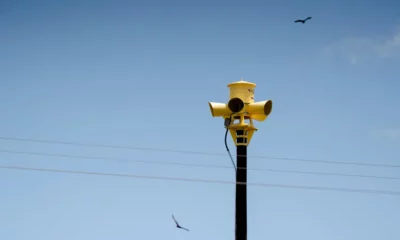News from the South - Arkansas News Feed
Using nitrogen gas in executions will further delay Arkansas death penalty
Using nitrogen gas in executions will further delay Arkansas death penalty
by Rich Shumate, Columnist, Arkansas Advocate
March 10, 2025
When it comes to administering the death penalty, perhaps the most intractable difficulty is that it’s just really, really difficult to kill someone in a way that isn’t cruel or unusual or messy or doesn’t make us unduly squeamish.
Taking someone who is alive and making them dead requires some level of violence — injecting a fatal dose of chemicals, zapping them with electricity, shooting them, breaking their neck with a rope — that raises profound moral and constitutional issues. And state legislators, including here in Arkansas, are finding new and creative ways to tinker with the machinery of death, as they try to overcome hurdles slowing the pace of executions.
Rep. Jeff Wardlaw, R-Hermitage, and Sen. Blake Johnson, R-Corning, have proposed a bill to allow the Division of Correction to use nitrogen gas as a method of execution, in addition to the current method of lethal injection. The bill has passed the House and will likely clear the Senate, given that 20 of the 35 senators are co-sponsors.
When Wardlaw defended his bill in committee, he said the idea sprang from a conversation with family members of victims of last year’s mass shooting in Fordyce about possible changes to the state’s death penalty laws. Attorney General Tim Griffin’s staff floated the idea of nitrogen executions during those discussions, he said.
A firing squad would be far less painful and far less horrific than a nitrogen execution.
– Rev. Jeff Hood, North Little Rock priest who witnessed an Alabama execution
Only one jurisdiction in the United States has ever used nitrogen gas for executions, the state of Alabama, which has killed four men with this method. And here’s what nitrogen gas executions there look like: The prisoner is strapped to a gurney, a mask similar to a fireman’s mask is placed over his face, and he is then suffocated with nitrogen, a colorless, odorless gas that isn’t toxic but kills by replacing oxygen in the lungs as the prisoner breathes it in.
Officials in Alabama have insisted that executions with nitrogen gas are painless and result in rapid unconsciousness. Wardlaw called it “a very quick, humane death.” But the Rev. Jeff Hood, an Old Catholic priest from North Little Rock — who witnessed Alabama’s first nitrogen execution last year of Kenny Smith — said what he saw was neither quick nor painless and amounted to torture.
“This is like strapping people to the top of a rocket and saying, ‘We don’t know where you’re going, but we’re going to light the fuse,” said Hood, whose ministry includes working as a spiritual adviser to Smith and other death row inmates.
Hood said he watched Smith struggle from the moment nitrogen was introduced into the mask, as his body began reacting to the loss of oxygen. Smith convulsed, strained so hard against the straps keeping him on the gurney that it shook, and pushed his face against the mask, which filled up with fluid as he struggled for air. It took 22 minutes before prison officials closed the curtains to indicate that Smith was dead.
Before the execution, prison officials placed oxygen monitors in and around the death chamber and required Hood to sign a liability waiver in case he was harmed by a nitrogen leak, which he said amounted to “the state admitting that there’s a danger to the people in the chamber.”
Having witnessed eight other executions using lethal injection, Hood said Smith’s execution with nitrogen “was by far the worst that I’ve ever seen” — so much so that he says he’d counsel inmates facing execution to select any other method if they are given an option.
“A firing squad would be far less painful and far less horrific than a nitrogen execution,” Hood said.
Hood is an anti-death penalty activist, and, as such, his views were treated with some indifference when he testified against Wardlaw’s bill at the Capitol. However, media reports of Alabama’s executions also describe prisoners struggling as they were being suffocated. And, of course, the problem with judging whether a new method of death is truly quick and painless is that the only people who can accurately describe the experience are dead.
The introduction of nitrogen gas as a method of execution comes as the death penalty has become something of a dead letter in Arkansas, primarily because the state is having trouble acquiring the drugs used in its lethal injection protocol as drug companies balk at getting involved.
Death sentences are becoming rarer (the 25 men on Arkansas’ death row have all been there since at least 2018), and the state has executed just four men since 2005.
All of those executions took place in an eight-day period in April 2017 as Gov. Asa Hutchinson and corrections officials raced to complete eight scheduled executions before the state’s supply of one of the lethal injection drugs expired — a gruesome spectacle that drew international condemnation.
Presumably, Arkansas would only proceed with a nitrogen gas execution as an alternative method if lethal injection continues to be unavailable. However, Wardlaw and Johnson’s bill leaves the choice of execution method entirely to the discretion of the director of the Division of Correction.
The bill doesn’t address the quality or concentration of the nitrogen or whether it should be administered with a mask or in a gas chamber, letting corrections officials develop a protocol for carrying out nitrogen gas executions with no guidance for how that should be done or the parameters of the protocol.
Critics of the bill believe those provisions run afoul of a 2012 Arkansas Supreme Court decision, Hobbs vs. Jones, that struck down the state’s death penalty statute because it gave the Department of Corrections too much discretion in what drugs would be used in lethal injections, without sufficient legislative guidance.
A statute that provides “absolute, unregulated and undefined discretion in an administrative agency bestows arbitrary powers and is an unlawful delegation of legislative powers,” the court majority said.
The irony here is that should the state ever try to execute an inmate with nitrogen, it will trigger a lengthy legal battle up and down both federal and state courts, which will indefinitely delay executions that the nitrogen option was supposed to jump start.
In addition, the three largest U.S. manufacturers of nitrogen gas have responded to states adopting nitrogen as an execution method by prohibiting their products from being used.
And that is the conundrum at the heart of the public policy debate over capital punishment — Arkansas and other death penalty states are tangling themselves in more and more legal, ethical and practical knots as they try to rescue a policy that remains politically popular but has become increasingly unworkable.
Given the legal challenges and the unavailability of drugs, there’s a decent chance that none of the 25 men on death row in Arkansas — some of whom have been there since the 1990s — will ever face execution, by either lethal injection or nitrogen gas.
The rational choice would be to accept that fact, move on, and stop pouring resources into defending an untenable policy. The irrational choice would be adopting a new, experimental method of execution, triggering a whole new batch of legal challenges, and pretending that we’ve figured out a way to kill people that’s less violent than the methods already in use.
Arkansas Advocate is part of States Newsroom, a nonprofit news network supported by grants and a coalition of donors as a 501c(3) public charity. Arkansas Advocate maintains editorial independence. Contact Editor Sonny Albarado for questions: info@arkansasadvocate.com.
The post Using nitrogen gas in executions will further delay Arkansas death penalty appeared first on arkansasadvocate.com
News from the South - Arkansas News Feed
Arkansas National Guard Texas flooding mission extended
by Antoinette Grajeda, Arkansas Advocate
July 14, 2025
Gov. Sarah Huckabee Sanders approved a weeklong extension of active duty for Arkansas National Guard troops assisting officials with recovery efforts in central Texas due to deadly flash flooding.
Twenty-two Arkansas National Guard troops who deployed to the Lone Star State last week were originally scheduled to conclude their work on July 12. They’ll now continue their duties through Saturday, according to a press release.
Arkansas emergency management team to assist with Texas flood recovery efforts
Nearly two dozen troops and four Black Hawk helicopters are assisting with the transportation of search and rescue personnel in central Texas.
In addition to the team of 22 soldiers, which consists of pilots and crew chiefs and six maintenance personnel, two other troops are serving as liaisons in Arkansas to coordinate direct support to deployed soldiers as needed, according to the release. Their mission was also extended through Saturday, though orders may be adjusted based on mission needs.
The Arkansas Division of Emergency Management joined recovery efforts Friday when it deployed a specialized two-person team to Texas that will support resource tracking, documentation, situational awareness and operational reporting, according to an agency news release. Team members will also act as liaisons between Texas and assisting states.
At least 120 people died and 160 remain missing after heavy rains led to flooding in central Texas on July 4, according to The Texas Tribune.
GET THE MORNING HEADLINES.
Arkansas Advocate is part of States Newsroom, a nonprofit news network supported by grants and a coalition of donors as a 501c(3) public charity. Arkansas Advocate maintains editorial independence. Contact Editor Sonny Albarado for questions: info@arkansasadvocate.com.
The post Arkansas National Guard Texas flooding mission extended appeared first on arkansasadvocate.com
Note: The following A.I. based commentary is not part of the original article, reproduced above, but is offered in the hopes that it will promote greater media literacy and critical thinking, by making any potential bias more visible to the reader –Staff Editor.
Political Bias Rating: Centrist
This content presents a straightforward news report on the Arkansas National Guard’s assistance in Texas flood recovery efforts, without evident political commentary or opinion. It focuses on factual information about troop deployment, official actions, and the ongoing disaster response, maintaining a neutral tone typical of impartial reporting. Therefore, it reflects a centrist, neutral political bias.
News from the South - Arkansas News Feed
Bentonville police search for possibly armed man on Crystal Bridges trails
SUMMARY: Bentonville police are investigating reports of a possibly armed man seen on Crystal Bridges trails around noon today. Authorities conducted an extensive search on foot and with drones but did not find anyone. At the time, several areas of Crystal Bridges were restricted to the public, but officials confirmed there is no ongoing danger now. The venue is currently closed as a precaution, prioritizing the safety of members and guests. News teams are seeking more information from local law enforcement and Crystal Bridges, but no further updates have been provided yet. The situation remains under active investigation.
Bentonville police searching for possible armed man
Subscribe to 40/29 on YouTube now for more: http://bit.ly/PTElbK
Get more Northwest Arkansas news: http://www.4029tv.com
Like us: http://facebook.com/4029news
Follow us: http://twitter.com/4029news
Instagram: https://www.instagram.com/4029news/
News from the South - Arkansas News Feed
Congress, state lawmakers move to juice aviation biofuel production
by Allison Prang, Arkansas Advocate
July 13, 2025
Congress’ passage of President Donald Trump’s spending and tax cuts bill this month could help grow the market for sustainable aviation fuel, a nascent industry that could be a boon for corn-producing states as airline operators are betting on it to decarbonize the sector.
The Republican budget reconciliation law that Trump signed July 4 pared back some of the credits for sustainable energy in the law that congressional Democrats passed and President Joe Biden signed in 2022 — the Inflation Reduction Act.
But the recent law extended one energy tax credit for producing clean fuels, such as sustainable aviation fuel, an alternative to the typical jet fuel planes use. The credit initially went through 2027, but the GOP law extends it through 2029.
Advocates for sustainable aviation fuel had been pushing Congress to extend the tax credit to support production as states across the U.S. have passed or proposed their own tax credits to grow the sector and lure production within their borders. Lawmakers in Iowa, Wisconsin, Michigan and New York have introduced bills enacting tax credits for sustainable aviation fuel.
For airlines, increasing availability of the fuel is essential for the sector to meet its net-zero goal for 2050, with the International Air Transport Association estimating the cleaner fuel could get the industry 65% of the way toward its target.
“We’re not yet at commercial-scale production and you need that longer lead time for these types of projects so I think the extension is really key,” said Chris Bliley, senior vice president of regulatory affairs at Growth Energy, a biofuel industry group.
While the credit’s lifetime was extended, others say the environment for sustainable aviation fuel isn’t as favorable as it was just a few years ago. The new budget reconciliation law also included provisions to lower the credit amount for sustainable aviation fuel specifically and clawed back unobligated grant funding to support the sector.
The amount of sustainable aviation fuel that producers make today is far from how much the airline industry needs to be able to use the alternative fuel regularly. U.S. production capacity over the last couple of years, however, has grown, jumping from less than 5,000 barrels per day at the start of 2024 to more than 30,000 by February of this year, according to a May report from the U.S. Energy Information Administration.
Badger State bill
Wisconsin state Rep. David Steffen, a Republican who sponsored a bill to incentivize sustainable aviation fuel, said he learned about a sustainable aviation fuel production company based in Madison called Virent Inc., now a subsidiary of Marathon Petroleum Corp. Virent’s fuel helped power the first domestic flight powered by 100% sustainable aviation fuel in one of its engines.
“I was intrigued that we had this company in our state and I want them and other companies of similar interest to find Wisconsin as their new home,” Steffen said. “It’s a great opportunity for not only the environmental benefits that come with it but for our farmers, dairies and timber producers to access a brand-new market for their product.”
Steffen’s bill also requires that to receive the tax credit, source materials for the fuel must be domestically sourced.
Wisconsin’s legislative session doesn’t end until next March and Steffen said he’s “very comfortable in saying (the bill) will have a clear path to the finish line.” Should it pass in its current state, the tax credit would go into effect in 2028.
Other states
Iowa, Illinois, Minnesota, Nebraska and Washington state all already have enacted laws to provide tax credits for sustainable aviation fuel.
Lawmakers in New York and Michigan have also proposed legislation to create their own tax credits. The New York bill barely moved in the most recent session, while legislation in Michigan has made it out of one committee and been referred to a second.
New York state Sen. Rachel May, a Democrat, plans to re-introduce the legislation next year. She said she wants to amend her bill to offer a larger tax credit for companies making sustainable aviation fuel specifically by mimicking photosynthesis so it doesn’t incentivize diverting feedstock like corn from being used for food, she said.
Her concern is moving the agriculture industry “away from both food production and maybe what might be the best uses of the land,” she added.
Corn ethanol, a common ingredient in automotive fuel, can be used to make sustainable aviation fuel.
Federal extension
While the extension of the federal clean fuels tax credit could be beneficial to the sustainable aviation fuel industry, the new law also lowers the amount of the tax credit for the fuel. It’s now the equivalent to what other biofuel producers qualify for, giving sustainable aviation fuel production less of a competitive advantage.
One version of the budget reconciliation bill also called for extending the tax credit by four years instead of two, but that got scaled back in the version of the bill ultimately signed into law.
The new law also took away any funding not yet obligated as part of a grant program for sustainable aviation fuel and makes fuels derived from feedstocks that come from outside the U.S., Canada or Mexico ineligible for the tax credit.
Despite any limitations, some analysts expect the law will still boost sustainable aviation fuel.
“The Trump administration has yet to outline its approach to SAF, but we expect the fuel to benefit from the administration’s focus on supporting biofuel-producing states,” analysts for Capstone DC, a firm that advises business clients on policy issues, said in a note in late June.
But changes to the federal tax credit could also make states more interested in adopting their own credit to support sustainable aviation fuel, Capstone added.
‘Not nearly as strong’
Tariffs, meanwhile, could also make U.S. feedstocks for producing the fuel more competitive, Paul Greenough, a vice president on Capstone’s energy team.
But Greenough cautioned that sentiment around sustainable aviation fuel still isn’t as rosy as it used to be.
“Momentum still exists for SAF but it’s not nearly as strong as it was under the Biden administration,” he said.
Some climate groups have also expressed concern over changing the clean fuels tax credit at the federal level. The Clean Air Task Force, ahead of the bill becoming law, said extending the credit will largely service other fuels that aren’t sustainable aviation fuel, which will in turn be costlier for the government.
“This purported attempt to incentivize ‘clean fuels’ is little more than a giveaway to the conventional biofuels industry,” the organization said in a post on its website.
Arkansas Advocate is part of States Newsroom, a nonprofit news network supported by grants and a coalition of donors as a 501c(3) public charity. Arkansas Advocate maintains editorial independence. Contact Editor Sonny Albarado for questions: info@arkansasadvocate.com.
The post Congress, state lawmakers move to juice aviation biofuel production appeared first on arkansasadvocate.com
Note: The following A.I. based commentary is not part of the original article, reproduced above, but is offered in the hopes that it will promote greater media literacy and critical thinking, by making any potential bias more visible to the reader –Staff Editor.
Political Bias Rating: Center-Right
This article presents a mostly factual overview of recent legislative actions concerning sustainable aviation fuel (SAF), with a focus on the bipartisan but GOP-led budget reconciliation bill signed by former President Donald Trump. The tone is generally neutral but leans slightly toward a center-right perspective by emphasizing the Trump administration’s role in extending energy tax credits and highlighting support from Republican lawmakers. It also includes critical views from climate groups and notes Democratic legislative efforts, maintaining a balanced presentation. The framing subtly favors market-driven, industry-supported solutions aligned with conservative energy policy approaches, rather than expansive environmental regulation favored by the left.
-
News from the South - Tennessee News Feed2 days ago
Bread sold at Walmart, Kroger stores in TN, KY recalled over undeclared tree nut
-
News from the South - North Carolina News Feed6 days ago
Boil water notice lifted in Hillsborough
-
Mississippi Today5 days ago
Hospitals see danger in Medicaid spending cuts
-
News from the South - Arkansas News Feed7 days ago
Arkansas Department of Education creates searchable child care provider database
-
News from the South - Texas News Feed5 days ago
Why Kerr County balked on a new flood warning system
-
News from the South - Arkansas News Feed7 days ago
Arkansas National Guard deployed to Texas to assist in flooding response
-
News from the South - Texas News Feed6 days ago
Sheriff hints at ‘after action’ review, as records reveal warning of ‘worst-case flood event’
-
Our Mississippi Home7 days ago
MDMR-USM Hatchery Training Program Enters Production Phase with Oyster Spawning and Mobile Unit Launch











































